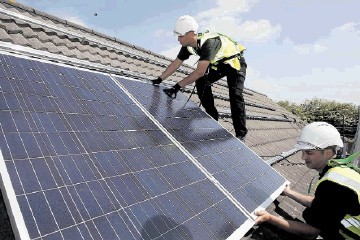
I SOMETIMES wonder whether those in government actually have their brains wired up differently to the rest of us.
Here we are in one of the most awful economic messes you could possibly imagine, yet Greg Barker, the minister for climate change, has said “feed-in tariff” subsidies for solar energy are far too generous and will be halved so potentially killing off an industry just as it’s making some progress.
Although it depends on the size of the installation you have, the average feed-in tariff for solar energy is about 43 pence per kilowatt/hour. But next week, that will fall to around 21 pence.
Why? Well of course this decision was actually taken by the chancellor – yes him again – who, having decided he hasn’t done enough damage to the energy sector with his oil tax rise, obviously thought that solar would be another soft touch.
He argued that the scheme has been too successful with more people taking advantage of it than expected.
According to the media, DECC (Department of Energy & Climate Change) has admitted that there have been three times more solar installations than predicted since the scheme began in April 2010 and that since then the cost of an average installation had fallen by at least 30%, meaning home owners need less of a subsidy to make money on the scheme.
It added that the proposed cuts would reduce the estimated cost of the solar feed-in tariff scheme in 2014-15 by three-quarters, to about £250million a year.
What the chancellor also said was that he recognises that the feed-in tariff is subsidised by other consumers and has pledged that it will not cost more than £23 a year per consumer by 2020 and so has to reduce the tariff rate accordingly.
Needless to say, solar panel suppliers and installers are not impressed. Many claim they will be put out of business and as a result, “thousands” of jobs could be lost.
It is likely fewer firms will offer “free installation” deals where in exchange for supplying and installing the panels they take the feed-in tariff. In effect you rent out your roof and get to use the electricity generated to reduce your own bills.
In addition, according to top bean counter Ernst & Young’s latest Country Attractiveness Indices report that looks at performance in the wind, solar and other sectors, this feed-in tariff policy change has led to the UK dropping to sixth in the overall rankings of 40 nations but it has plunged three places to 22nd for solar.
Now, putting aside all the anger that this decision has generated, the serious question is whether it matters? Germany has already cut its feed-in tariff for solar and it turns out that Denmark never had one. So the situation here isn’t unique or harsh. For me though the point of solar or any other so-called “renewable” system is to reduce reliance on energy produced by conventional means which, as we all know, is increasingly expensive. It also reduces pressure on conventional energy.
Of course, the real aim of the solar industry is to achieve so-called “grid parity”, which is the point in time when the cost of generating electricity from solar matches conventional generation.
The good news is that this point may not be far off. In fact, in some parts of the world there is strong evidence that this has been achieved already.
These are, of course, places where there is strong and consistent sunlight such as Hawaii and South Africa. But this couldn’t have been achieved without improvements in the cost of photo-voltaics.
Does that mean the chancellor and the Treasury have a point after all?
Well, no they don’t, and indeed, they rarely do.
Firstly, solar energy works. It ain’t perfect and as I said it is unlikely to reach grid parity in Scotland yet.
If it’s lacking anything it’s a solar energy storage system but that may not be far away. In fact, a Spanish company has already built one capable of providing an overnight buffer.
Secondly, installers and companies that assemble solar cells into panels employ people and pay taxes. We may not – as far as I can tell from Google – make the cells here, but even that may yet be possible as at least two Scottish universities are working on new photovoltaics production technologies.
Thirdly, it has to be apparent that the UK economy is in one heck of a mess.
As part of their overall master plan one of the current government’s policies is to make us less reliant on financial services by broadening the economy and recovering manufacturing.
I believe that if the numpties in the Treasury had one iota of intelligence they would, in fact, recognise solar energy as a cheap way of assisting people in so-called “energy poverty” on a permanent basis rather than having to drip feed benefits that must rise over time.
The chancellor needs to delay his feed-in tariff cut and reflect on the consequences as well as the alternatives. If he doesn’t then he may not just be missing a trick but he will be reinforcing his credentials as someone who is incapable of thinking beyond the end of next week.
Here’s wishing everyone a great Christmas.
Recommended for you
